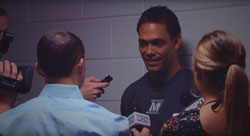President Donald Trump signed an executive order to cut federal funding for colleges or universities who attempt to limit their students’ freedom of speech on March 22.
In a press conference prior to signing the order, Trump said, “Many [universities] have become increasingly hostile to free speech and to the first amendment.”
Across the country, the responses have been mixed towards the order. Some say this is a reiteration of what’s already in place, while others see it as a strike towards safe spaces inhibited on campuses.
Most of the editors were supportive of the order. In favor of it, an editor said, “A university is a place where ideas and opinions should be promoted and shared. Research starts with basic fundamentals like these, so it is important that universities promote the idea of an open forum.”
While a majority of editors liked the idea of the executive order, some mentioned the fine line between freedom of speech and hurtful rhetoric. An editor stated, “I do understand the purpose of enforcing this idea because universities should be an open forum for discussion and collaboration.”
The editor continued, “However, if someone’s opinions can be harmful to others on the campus or incite violence or bigotry, then the university should have discretion over what speech should be allowed.”
A trend on college campuses has been the creation of designated safe spaces to discuss sensitive issues. According to an article published by Slate explaining safe spaces, safe spaces are defined as “extracurricular groups that are intended to be havens for historically marginalized students.”
Trump’s order made the editorial staff consider the effects of safe spaces as a whole, which generated varied opinions. An editor spoke against safe spaces with, “I think that they are, in a way, against free speech. I think it’s important to uphold the values of the freedom of speech in America.”
Another editor spoke positively about safe spaces and said, “I think that safe spaces are useful, since they may provide someone comfort to share their ideas with like-minded people,” said an editor.
Others fell in between on the matter, with one editor who believed, “The idea of a safe space is kind of unnecessary. You should be able to express your thoughts anywhere you’d like. America is a safe space.”
In reflection of Monmouth University’s role in freedom of speech, most of the editors felt that the University has done well at promoting everyone’s right.
“College [Democrats] and GOP (Republican Party) just had a recent bipartisan event, hosting political figures from both parties. Monmouth does a good job at ensuring balanced and fair views, at least as an institution,” an editor said.
However, the editor did mention the University’s pitfalls with freedom of speech. “There hasn’t been much done though to punish people who have drawn swastikas on buildings. That sort of ‘free speech’ should never be tolerated,” the editor added.
Another editor mentioned a movement against free speech on campus. “In one of my classes, a Catholic student was trying to explain his religion to the professor, but she told him his interpretation of it was wrong,” the editor stated.
While discussing the matter, each editor disclosed that this was through their personal experience at the University and recognized that others may have gone through different instances of speech limitation or promotion.
Looking forward, each editor offered solutions on how they could help elevate freedom of speech on college campuses. One editor recommended, “Students be required to take a class on discourse and how to communicate effectively.”
Another editor suggested that more students work together on projects and ideas that represent and support the various thoughts of the student body.
“It’s important to have your own way of doing things, but you have to understand where other students are coming from as well,” said an editor.
A solution made by one editor felt like a culmination of all the staff’s ideas. “I think encouraging students to have their own forums and discussions on campus and have the ability to organize,” the editor said.


